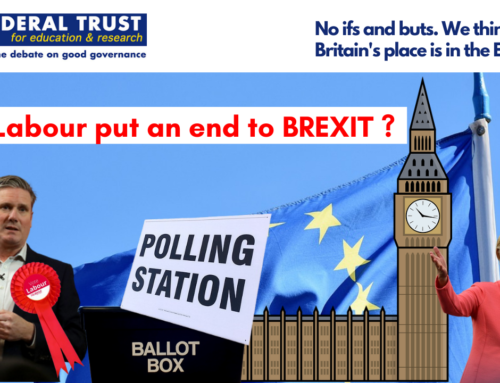Will there be a No Deal Brexit or a Free Trade Agreement, of some kind, by 15th October 2020? This was the date by which UK Prime Minister Boris Johnson insisted an accord should be reached or, as he put it, Britain would simply walk away.
Regaining British sovereignty?
Given Johnson’s 15th October deadline was purposely chosen to coincide with the autumn European Council gathering of leaders, held in Brussels every year, it begs the question whether Johnson is really planning to walk away or to stay and uncork the champagne as a deal is struck just prior to this summit!
The stark truth is that a theatrical and glory-seeking politician, such as Boris Johnson, would inevitably be tempted by the opportunity to celebrate, on a major international stage, for what he would claim to be a negotiated free trade deal which secures the supposed return of the UK’s sovereign status as an independent nation.
Whether the free trade deal that will likely be eventually concluded between the EU and the UK, being one which derives some of the EU Single Market’s benefits, alongside fewer, but also new obligations, will really mean a return of sovereignty sought after by many Brexiters will probably become an open and contentious question for many years to come. In today’s complex world of international economic and political relations, modern-day free trade agreements, particularly within a regional context, inevitably require multiple cross-border responsibilities that go beyond mere tariff- and quota-free cross-border trade.
Under the various sets of negotiations which have already taken place and in upcoming envisaged talks, these obligations will likely involve some degree of EU level playing field criteria to be applied in state aid (referred to in the talks as “open and fair competition”), environmental, social, employment, health and safety standards – all of which would be subject to joint EU-UK horizontal governance arrangements. Indeed, the EU is also pressing for fisheries, transport and energy, among other areas, to fall under joint EU-UK horizontal governance, but which the UK has been loath to give ground on until recently.
Paying heed to the economics of gloom and doom
In achieving a likely fudged free trade deal, one cannot deny the devastating economic and health impact Covid-19 will play in ultimately bridging the two sides’ differences. Arguably, Covid-19 has already become the almost exclusive influencer in these negotiations (aside from growing uncertainty over Downing Street’s relations with both sides of the aisle on Capitol Hill in Washington DC), the effects of which have only yet to be fully realised, but which is just a matter of time as economies across Europe and the world reel from its deadly scourge.
In recently released data, over the three months to June 2020, the UK economy is reported to have contracted by -19.8%. It is the most precipitous fall in output ever. It is also the second quarterly decline in Britain’s GDP, thereby officially marking a recession, following a -2.5% drop in the previous quarter.
Europe’s economies have fared little better. The Eurozone economy shrunk -14.7%, in the second quarter and also entered a recession. The big four EU economies also registered record slumps, including Germany at -14.7%, France at -18.9%, Italy at -17.7% and Spain hardest hit at -21.5%. As re-infection waves hit and uncertainty over the extent of the economic shutdowns required, the economic crunch does not look like ending any time soon.
Crucially, on the trade front, where a substantial portion of an estimated €1 trillion in two-way annual flows are at risk, from a no-deal Brexit alone, that pain will be greatly magnified by the impact of the Covid pandemic.
Poles apart
While messaging from the EU throughout the entire scheduled negotiating process, over March to September, was transparent and informative of the state of negotiations, the level of communication from the UK side was either minimalist or typically replete with sweeping negative statements of the other side’s position, after each and every round.
Worse still were the government’s polarizing tactics. On 8th September, just as the 8th and penultimate round of negotiations had begun, Downing Street published the Internal Market Bill (IMB), while media leaks of the controversial legislation first appeared only a couple days prior.
The shock proposed legislation quite literally dumbfounded the entire rules-based world, as it threatened to subvert international law by rewriting sections of the EU-UK Withdrawal Treaty. In response, the EU called for removal of those sections aimed at revising the treaty, by a deadline of 30th September.
As the EU took stock of this unprecedented turn of events, the European Commission’s Vice President, Maros Sefcovic, reiterated the EU’s position that it would not under any circumstances walk away from the talks as the deadline for the end of the transition period expired without any action being taken by the EU. Subsequently, on 1st October, the Commission instituted infringement proceedings subjecting the UK to legal action at the European Court of Justice. Hefty financial penalties could arise were the UK government to invoke the IMB in amending the Withdrawal Treaty.
However, the EU’s response was not published before the United States Congress had already waded in against the UK. Both Congressional Republicans and Democrats roundly condemned the proposed legislation’s flouting of international law and its undermining of the US-backed 1998 Good Friday Agreement in establishing a peace process for Northern Ireland.
Scared off by American threats of abandoning bilateral free trade talks, amid other sharp rebukes from across the Atlantic, the government backed away from much of their belligerent communication with the EU, while still proceeding to pass the controversial law through Parliament.
Light at end of the “tunnel”?
According to Michel Barnier, in a press statement issued at the end of round 8 of talks, the EU had made efforts to fully respect the UK’s sovereignty, in particular with regard to the role of the European Court of Justice, the UK’s future legislative autonomy and fisheries, while the UK had not reciprocated on fundamental EU principles and interests. Barnier explained further that, “The UK is refusing to include indispensable guarantees of fair competition in our future agreement, while requesting free access to our market”.
The EU noted the UK’s statement on a “new approach to subsidy control”, but which fell significantly short of the commitments made in the Political Declaration. It also stated that the two sides were still missing important guarantees on non-regression from social, labour, consumer and climate standards. Moreover, the UK had not engaged on other major issues, such as credible horizontal dispute settlement mechanisms in the form of level playing fields requirements, including in the areas of transport and energy.
Still, in spite of this negative backdrop, both parties expressed their interest that should the 9th and final round create sufficient common ground, they would then proceed with intensive negotiations, known colloquially as the “tunnel”, over following weeks. In a Reuters report quoting a senior EU diplomat, on 1st October, the UK government signalled “a very strong intent in entering the tunnel” and that “we remain hopeful that a deal will be concluded”. Downing Street affirmed this as a possible approach, on 2nd October, disclosing that Johnson will speak with EU Commission President, Ursula von der Leyen, over the weekend, taking stock of the 9th round of negotiations and deliberating over next steps.
A desert island surrounded by fishing trawlers
As the last round of negotiations kicked off, on 30th September, Downing Street correspondingly announced a bilateral agreement on fisheries with Norway.
Johnson’s office trumpeted the new accord as one made exclusively between independent coastal states in pursuit of their individual national interests. In so doing, it neglected mentioning that Norway provides access for all EU member states’ fishing trawlers, to its territorial waters, under the European Economic Area agreement.
Somewhat less vociferously, it then emerged that the government made concessions over access to its territorial waters by offering the EU a three-year transition period on fishing involving a reduction of the EU’s share of the catch over that time.
Such a gesture, even though turned down by the EU, was a signal that the government was now preparing to compromise on its red lines, parting ways from its self-imposed “Robinson Crusoe” island status.
A way forward on state aid
As the UK showed tentative signs of compromising on fishing, it raised hopes for resolution on its most pronounced red line – state subsidies. The government reportedly proposed a set of principles to guide domestic state subsidies, but where no enforcement mechanism would exist where those principles were flouted. The UK pointed to the EU’s FTA with Canada, which applied similar rules. However, the EU rejected this option for the UK and pointed to its FTA with Japan as the model to be applied. This agreement imposes controls over state subsidies, including that of not providing open-ended public funding commitments to individual companies. In support of this position, the EU pointed out that the UK had also adopted these state aid provisions, very recently, in its own FTA with Japan.
Given such an impasse, at the last scheduled round of negotiations, it may be that a compromise is reached in the coming “tunnel” phase of negotiations. Accordingly, one alternative would be for the UK to adopt the World Trade Organisation’s “WTO” subsidy code, but enforceable by independent arbitration. Such a measure could find favour with both sides. This is partly because the EU and the UK are looking to strengthen and update the WTO on many levels including transparency on state subsidies and effective dispute resolution mechanisms. More importantly, during the various rounds of scheduled talks, the EU had moved ground significantly on not requiring the deal to be exclusively governed by the European Court of Justice and EU law, rather by a joint governance approach subject to impartial arbitration in the case of disputes – an offer to which the UK had reportedly not fully responded during those talks.
Whether the WTO solution will be the appropriate middle ground in the fierce pitched battle over state subsidies, especially as the conflict over the IMB rages on, in tandem, will likely remain an open question to the bitter end.
With the last round of scheduled talks having ended, on 2nd October, both sides are reportedly continuing to talk beyond the formal end of negotiations, after which a statement will be issued. This may allude to a switchover for intensive negotiations through the so-called “tunnel”, although more likely such a decision will need to be agreed by Johnson and von der Leyen during their discussions on 3rd October.
While any prospective joint burrowing will be intent on agreeing a deal that could be legally set in motion by 1st January 2021, the likelihood is it will be a fudged exercise reminiscent of another famed tunnelling project linking the UK to the European mainland, a project that took more years to complete and at a hugely greater cost than originally anticipated. For Boris Johnson, that may well mean having to delay waving the Union Jack and grandstanding in London during the Brussels summit on 15th October!






[…] two countries. The stark reality was that a “fudged” agreement (see my Federal Trust article, “EU-UK talks look like “tunnelling” towards a fudged deal”), or what Sir Keir Starmer has recently expressed to be a “thin” deal, was always on the […]